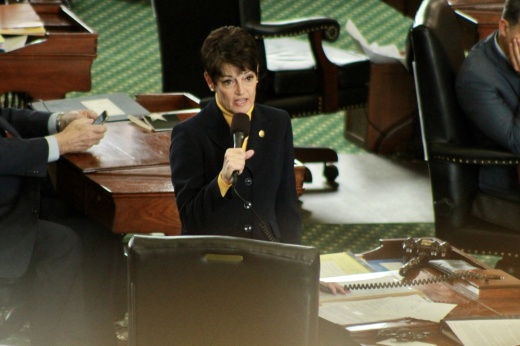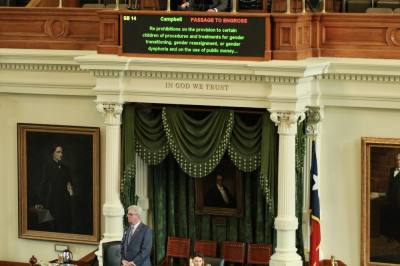Senate Bill 14, by Sen. Donna Campbell, R-New Braunfels, would prohibit anyone under the age of 18 from receiving puberty-blocking medication, hormone therapy or gender confirmation surgery. Doctors who provide these treatments would lose their medical license, according to the bill text.
Under the bill, public funds could not be distributed to hospitals, medical schools or doctors who provide transition-related care. State health insurance plans also would not cover the treatment.
The bill includes an exception for the treatment of children who are intersex, which means they have reproductive or sexual anatomy, including chromosomes, that do not align with the traditional male and female binary. According to InterACT Advocates for Intersex Youth, approximately 1.7% of people are born intersex.
In a 19-11 vote, the Senate decided April 3 to remove an amendment filed by Campbell, which the chamber had unanimously approved the week prior. The amendment would have allowed children receiving puberty blockers or hormone therapy 90 days before the proposed law goes into effect—Sept. 1—to continue with their treatment.
Campbell said she withdrew the amendment because it had not been discussed in the Senate Committee on State Affairs before being presented to the full Senate.
“There were so many questions that have been brought up since the amendment was put on that out of respect for the body, we’re going to ask that it be taken down,” Campbell told her colleagues.
The amendment was supported by Rep. Tom Oliverson, R-Cypress, who authored the House’s version of the legislation, House Bill 1686. He defended the amendment in a March 30 tweet, stating it was “factually accurate and misleading” to assume the change weakened the bill. Outside of their legislative work, Oliverson is an anesthesiologist, while Campbell serves as an emergency room physician.
Sen. José Menéndez, D-San Antonio, spoke against removing the exceptions from the bill April 3.
“I worry that under the guise of protecting children, we’re actually going to hurt many children and their families,” Menéndez said.
The Senate continued its discussion of the bill and how it could impact Texans on April 4.
“Children who are on puberty blockers or cross-sex hormones need more counseling and love. They don’t need blades and drugs,” Campbell said.
Menéndez said all major American health care organizations, including the American Academy of Pediatrics, the American Psychological Association and the Endocrine Society, have expressed their support for hormone therapy and other medical treatment for transgender minors.
“What I can't stand for is the rhetoric and narrative we are painting about a very, very small group of people, many of whom are not in this room or with access to the microphone,” Menéndez told his colleagues, asking them to vote against the bill.
Menéndez also spoke directly to transgender Texans and their families.
“I see you. Please know that you have a lot of life to live, and many people to love you,” he said. “You have much growth ahead of you. Please don’t let this or anything we do in this building discourage you from flourishing.”
To the parents of transgender children, Menéndez said, “We know you’re not perverts; you’re not pedophiles. You’re parents who love your children, and you’re doing the very best you can to keep them safe and to let them know that they’re loved.”
The bill was approved by the Senate in a 19-12 vote along party lines. It now heads to the Texas House. Oliverson’s bill, which is identical to Campbell’s proposal, is being considered by the House Committee on Public Health.
In an April 5 tweet, LGBTQ+ advocacy organization Equality Texas said "Health care for trans youth is under attack. TX lawmakers have no place in private medical decisions that belong to a family & their doctor. We must #protecttranskids and ensure their access to essential health care, like puberty blockers."
Lt. Gov. Dan Patrick, who oversees the Senate, has listed banning transition-related care as one of his top priorities for the current legislative session.
“As lieutenant governor, I believe the practice of child gender modification is abhorrent and must be stopped in Texas,” Patrick said in a statement following the passage of SB 14. “The Senate and I have been committed to banning the practice of child gender modification.”






